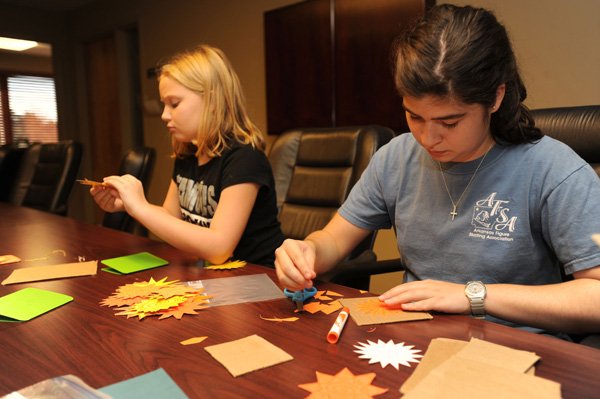When a shopper buys a Christmas ornament from youngsters at the First Presbyterian Church’s annual Alternative Market, a community in Haiti - or some other developing country - gets fresh water.
That’s what the Alternative Market is all about, according to Ellie Dugan, one of the organizers for the Fayetteville event. All of the vendors on Nov. 11 and Nov. 18 are nonprofit organizations, offering unique gifts that benefit the people they serve.
“We are very excited that our market continues to grow, and we are able to add more nonprofits each year,” said Dugan, who has been involved with the event for more than a decade.
Among this year’s vendors are:
Feed Fayetteville, new to the market this year, off ering homemade jams, jellies, holiday cards and a “buy a crock pot” for a student plan.
Life Styles, offering paintings, drawings, handmade jewelry, tote bags, mouse pads, knitted hats and neck pillows made by the residents of Life Styles, which serves adults with disabilities.
Peace at Home, offering gift cards for a family’s safe nights in a shelter, for art therapy for domesticviolence survivors and for transportation to safety.
The Presbyterian Women’s group Hooks AndNeedles, offering knitted children’s hats and mittens. The hats and mittens are purchased by shoppers,placed on the tree and then distributed to area schools.
Ms. Agnes’ Orphanage of Uganda, oft ering handmade jewelry, bags and artwork to benefit the children of Uganda.
And the Christmas ornaments made by youngsters of the church to support two Presbyterian programs, Solar Under the Sun and Living Waters for the World.
Both programs go into developing countries, one to provide solar power, which in turn pumps and treats drinking water, explained Kristi Button, director of Christian education for the Fayetteville church. Gift buyers get cards with a tin-punch-type ornament attached, “something fun and tangible that somebody can have and say ‘I gave to charity in your name,’” Button said.
James F. Moore Jr. , a retired orthopedic surgeon, has seen firsthand the work of Solar Under the Sun and Living Waters for the World. After training at Ferncliff Camp and Conference Center in Little Rock, Moore was part of a group of nine who visited Haiti in March.
Moore, who had been on a couple of church missions to rebuild New Orleans after Hurricane Katrina, said his eyes were opened before he ever left the United States.
“To get ready to go to a country like that is quite different,” he said. “To go to New Orleans, I needed a tetanus shot. To go to Haiti, I needed hepatitis A and B, typhoid fever vaccine, chloroquine because of endemic malaria, and we took medicine with us in case anybody developed cholera.”
Much of the illness in a developing country comes from fetid water, Moore said, and that was true in Haiti, too, still recovering from a major earthquake in 2010.
“I saw one stoplight in Haiti, and it wasn’t working,” Moore said. “There just isn’t much in the way of services anywhere in the country.”
Moore and his companions first traveled north to the community of Arcahaie, about a three-hour drive from Port-au-Prince on dirt and rock roads. Thanks to the Living Waters pump system, the city of about 100,000 was able to get clean water for drinking and cooking, delivered to residents in 5-gallon bottles. But with electricity available only about four hours every evening, converting the pump system to solar power would be anotherboon to the townspeople, Moore said.
The group’s second stop was Montrouis, “a beautiful place up on the coast.” There, the volunteers installed new solar-powered pumps to bring water up from a safe depth. In a town without much in the way of a sewer system or garbage pickup, Moore said getting down to safe water was vital.
“This project is something I really believe in because so many illnesses and diseases come from not having sanitary conditions and good drinking water,” he said. “Their lives are so much better and they can live so much longer with good water.”
Plus, Moore added, the solar panels will last 25-30 years, and locals are trained to maintain them, “so it’s their project, too.”
Religion, Pages 10 on 11/03/2012

